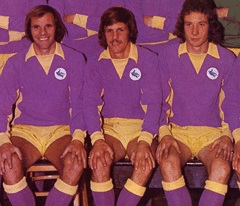Quite unusually, Cardiff City’s season is coming to a gradual halt with no promotion or relegation issues to concentrate on. Just four matches left, with the first of those at Brentford tomorrow evening – here’s seven questions on our opponents with the answers to be posted on here on Wednesday.
60s. Beginning his career in the city of his birth playing for the Hatchetmen at Seaview, this forward scored goals wherever he went, but he scored most for Brentford. His first move saw him playing in Brentford’s colours and scoring at a rate of better than a goal every other game, but the arrival of an England striker whose record was even better saw him drop out of the side and he was eventually transferred to wild Rovers to the south where he did pretty well for a couple of seasons. He next moved to a place which calls itself an “industrial garden town” (most of the industry’s gone now though). This club became the first in the Football League to move to a new stadium in thirty three years, but this was a long time after our man left having scored at a rate of better than one in three in just over a season there. Brentford, his next club, was an unusual move for him in that he came south of Watford for the only time in his career, but he must have been happy there because the four years he was with them was a long time by his standards. It was back up north after that with a club with an x in their name and then he finished his league career with five years at a County set that has hopes of a return to the Football League next season. His last club saw him playing in a city with a name which is the same as a town in his homeland and, in doing so, he took the number of countries he had played in to three. Internationally, the first of his four caps came in a 3-2 defeat by Wales, can you name him?
70s. This defender started off playing for a club that had a preoccupation with building a white elephant stand which had a good deal to do with their subsequent relegation towards the end of his time with them. Never establishing himself at his first club, his move to Brentford was a short one both in terms of distance and time spent there, but he did enough to earn himself a move to a higher division for a pretty big fee in those days to another club that played in a combination red, white and black. There was a relegation and a promotion during the seven years he was there before he stayed in the same three colours again to team up with a club in the midst of a fairly rapid drop from the top flight to the bottom one. His last club saw him get a change of colours in a location well to the south of his previous two where he represented a team that gained only its second win in its last twenty six matches on Saturday. He played once for his country, against Denmark, but who is he?
80s. A much travelled Brentford player of this decade, he and his family took thirty three chickens, three horses, two dogs and two ducks with them when they moved from Leicester to Blackpool (he also acquired seven turkeys while at Blackpool), while he once came fifteenth in a Time Out poll to find the funniest person in London – who?
90s. A scorer for Brentford against us during this decade, he was once sent off at Ninian Park while playing for Swansea, who is he?
00s. Brentford scorer out of Nepal and Suva?
10s.Man of the cloth from Shropshire turns up at Cardiff City Stadium?
20s. He’s a member of the current Brentford squad and his first three teams in senior football were Hadley, Hayes and Hendon – who?
Answers.
60s. Belfast born Ian Lawther signed for Sunderland from Crusaders and did very well there for three years before the arrival of Brian Clough saw him relegated to the reserves and an eventual move to Blackburn. Scunthorpe were Lawther’s next side and then after his spell at Brentford between 1964 and 1968, he signed for Halifax. Three years later, he moved to Stockport and then had a season at Bangor City before retiring in 1977.
70s. Stewart Houston started his career at Chelsea, but only played nine league matches in the five years he was with them. After an initial loan spell at Brentford, he jointed them permanently in 1971 and did well enough to earn a £55,000 move to Manchester United in 1973. Houston played over two hundred league games for the Old Trafford team, winning a Second Division title medal while he was there, A new decade brought a move to a new club in Sheffield United and he was part of a squad that was relegated to Division Four for the first time in their history, but he won another title medal when they made sure their start was the shortest one possible the following season. Colchester were Houston’s final team, playing over a hundred times for them to take his career record for league appearances to just under five hundred before retiring in 1986.
80s. Ian Holloway.
90s. Joe Allon scored for Brentford in a 1-1 draw against us at Griffin Park in November 1993 some six years after he had been sent off in Swansea’s 1-0 loss at Ninian Park in August 1987.
00s. Paul Evans.
10s. Harley Dean.
20s. Charlie Goode.




